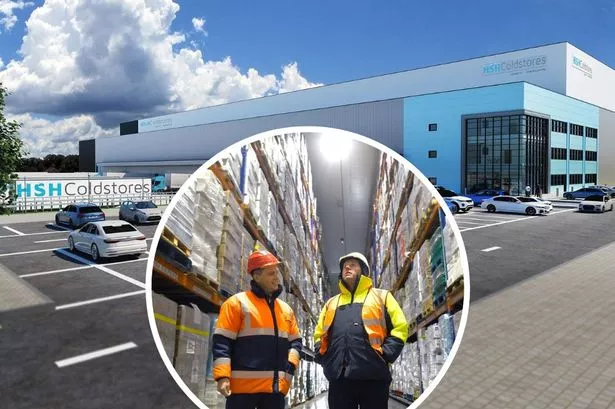
£5m boost defrosts huge Grimsby cold storage expansion after costs soared on £30m plant
Grimsby’s cold storage capacity is to be increased by 20 per cent after £5 million of government support was netted for a key project. Brexit and Covid have put pressure on a vital element of the wider seafood sector, with it trading at over-capacity for the past six months, as just in time imports have switched to more considered buying by the town’s cluster of processors. The £30 million Europarc proposal from HSH Coldstores is fully consented and will create 60 new jobs, with the potential to unlock hundreds more in Grimsby. It was the lead beneficiary from the first round of the UK Seafood Infrastructure Fund, with £20 million being invested nationwide. Read more: Seafood processor swoops for neighbouring home delivery specialist A further £2.4 million has been awarded to JCS Fish to expand its processing operations in the town, with cash for projects in Fort William, Peterhead and Alness in Scotland, for Mowi, Denholm Seeafoods and Aquascot; Shoreham Port for vessel maintenance and Falfish Ltd in Newlyn ad Mevagissey. Henry Pringle, chief operating officer for Constellation, HSH's parent company, welcomed new Fisheries Minister Mark Spencer to the existing Birchin Way site, taking him on a tour of the huge operation. He said: “We are running at over-capacity, we’re storing in the aisles, it is everywhere, and it is not just us. Everyone in Grimsby is full. We see that as a major impediment to Grimsby industry, processing depends on cold storage and occupancy at the moment creates tonnes of additional cost. We cannot take in additional customers, and we’re having to shuttle to the Midlands and Peterborough. “Grimsby being the centre of fish and seafood processing in the UK, a lot of the supply chains are dependent on imports. This is the main fish and chip shop warehouse for the UK.” Cold storage is required for raw product, ingredients for value-added processing and pre-sale holding, with transportation to and from the cluster adding to the cost, and eroding competitive advantage. Mr Pringle said: “We are looking at building a new facility within Grimsby, supporting 30,000 pallet spaces. There are 150,000 currently, so that will be increasing by 20 per cent.” The 52-year-old second generation business holds a third of the market share in the town, and will employ 200 people when the addition completes, scheduled for early 2024. It is currently being rendered for, and has been hit by inflation in the building materials market. Of the reasoning behind the demand, Mr Pringle said: “We are at peak season going into Christmas, there has been a bounce-back post Covid and Brexit concern means no-one wants just-in-time inventory. The model is now to import and hold greater stock. “We wouldn’t be able to do this without the grant funding. Capital expenditure accelerated, construction costs have gone through the roof and while they have come down, they are not where they started. This really gets us across the line in terms of making it viable.” When first announced in May 2021, with Europarc developer Wykeland, the 171,000 sq ft site had a price tag of £15 million, though 25 new fuel efficient trucks with the latest refrigeration technology are also part of the successful bid. At JCS, a state-of-the-art 2,000 sq m fish processing factory with integrated smokehouse is to be developed, doubling salmon and trout processing capability to 20 tonnes per day. It could bring 32 jobs to the town, while reducing reliance on imports. It came as it was announced in Tromso, Norway, that the next International Coldwater Prawn Forum will be held in Grimsby in 2024, likely to bring more than 200 delegates. The town successfully hosted the World Seafood Congress in 2015. Mr Spencer, appointed to Defra under Liz Truss, and the representative for Sherwood in Nottinghamshire, said: “We are adding value to the processing sector, building extra storage that helps with the supply chains and generates jobs. “This is about investing for the future and making sure we have one of the most robust, sustainable and employable industries in Europe. We are now competing with our colleagues across the water, we want to make sure the UK fisheries sector is robust and fit for the future. “It demonstrates our huge opportunities in this sector, and I think this will assist on that journey, moving forward in the new world post-Brexit, and I think it is great news for the sector, it proves we can do it here in the Uk and do it very successfully.” He rejected the idea it was paying for issues arising from the vote to leave, despite the stated change in business model. “Companies are holding more stock because they are confident in the future and confident they are going to sell it,” he said. Icelandic Seafood International’s decision to exit UK operations, putting 200 jobs at risk in Grimsby, was raised with the Minister. He claimed administrators had been appointed in media interviews, but this was refuted by the business, which is working with specialist MAR Advisors to achieve a sale. The company operates the huge former Five Star Fish plant on Great Grimsby Business Park, having merged two businesses into it as Covid struck UK shores. Mr Spencer said there would be “wrinkles on the way” following Brexit, with the company’s chief executive having pointed to harder trading conditions as part of the reasoning, with losses of £12 million revealed. He said: “It is very sad for these people, losing jobs - potentially - and I hope the administrator can find someone to take it on lock, stock and barrel. With this investment there will be other jobs in fish processing industry and as a nation we have reason to be optimistic about the future.” ISI had announced it was to pull out of the UK in a trading update last week. It is rigorously pursuing a sale, with interest mooted. Following his comments, to several media outlets, Bjarni Ármannsson, Icelandic Seafood International group chief executive, said: "Iceland Seafood is running a sales process on its UK subsidiary, Iceland Seafood UK, after having decided to exit the UK value-added operation. "MAR Advisors have been mandated to run the process. We are currently presenting the company to prospective buyers. As Iceland Seafood is a publicly-listed company we will report the outcome of such a process at an appropriate time to the market. Any suggestions that Iceland Seafood UK is in a liquidation process are false. That is not the case at all." Grimsby MP Lia Nici had earlier in the week taken to social media to air her concerns about finding out about the company’s plight via social media. The Westminster agenda led to her missing Mr Spencer’s visit, but she met with him in London prior to his arrival.
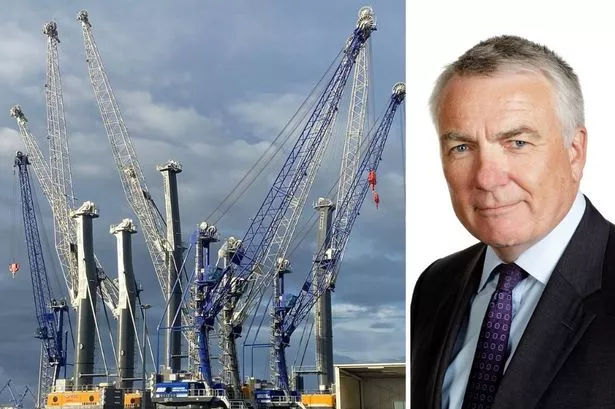
£10m crane investment on its way to Port of Immingham
A £10 million investment in cargo-handling equipment is on its way to Immingham. Engineers from Associated British Ports have just returned from Germany where they have carried out final factory acceptance testing on three new mobile harbour cranes. The hybrid Liebherr 420s will be arriving later this month from Rostock, at a cost £9.7 million, with an additional £500,000 spent on new grabs. The diesel generators poweing them can run on hydrogenated vegetable oil, with the option to switch to all-electric, reducing CO2 emissions as the port accelerates its green credentials. Read more:ABP and Harbour Energy partner to provide CO2 import gateway at Immingham Simon Bird, ABP regional director, had outlined a £30 million spend on equipment earlier this year. The order represents the largest shipment by the manufacturer to the UK. He said: “This is another great investment in the port. It offers our customers a range of equipment, these being specially optimised for vessels in the post-panamax class. “It’s part of our wider strategy investment in future-proofing the Humber ports and giving our customers the confidence that the ports remain resilient, and we are giving them what they need in having reliable and efficient cranage.” They are described as offering greater versatility, being able to be deployed on any quay, though primarily they will be used for bulk cargo and scrap handling. They have a 124-tonne lifting capability, and offer greater safety improvements in the driver’s cab.
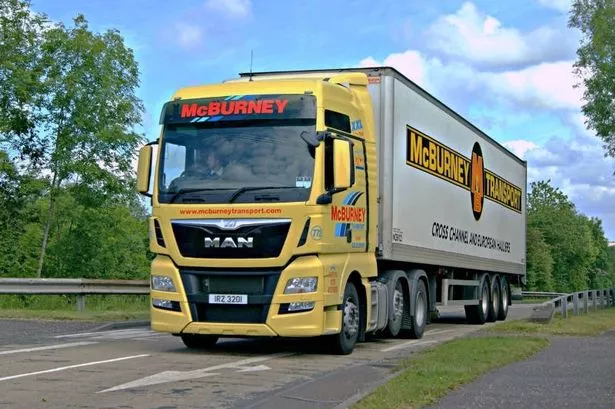
McBurney Transport snapped up by Danish logistics giant DFDS for £138M
Ballymena haulage company McBurney Transport has been bought by Danish shipping company DFDS for nearly £138 million. The move sees the company, which employs more than 800 people across the UK and Ireland, become part of one of the world’s biggest logistics companies as ownership transfer from the McBurney family who founded the business in 1965. McBurney Transport focuses on transporting trailers between the island of Ireland and Great Britain, the majority of which are temperature controlled units carrying chilled goods. Under one of its subsidiaries, Bondelivery, it also owns warehousing facilities in Northern Ireland which focus on fulfilment for the retail sector and last mile delivery across the island of Ireland. It operates some 400 trucks, 1,360 trailers of which two thirds are refrigerated. Founder Norman McBurney OBE said the takeover provides opportunities for the company. “By becoming part of DFDS we gain access to new development opportunities,” he said. “ I am certain the wider market coverage, including access to DFDS’ extensive transport network, will benefit our many longstanding customers. “I am confident that our many loyal and dedicated employees will be comfortable and happy after this transaction.” DFDS provides ferry and transport services throughout Europe, is headquartered in Copenhagen and listed on city’s Nasdaq stock exchange. Its chief executive Torben Carlesen said the acquisition was a strategic fit for the business’s cold chain logistics. “The acquisition of McBurney Transport Group greatly enhances the scope of our customer offerings on the island of Ireland and in the UK, particularly towards the resilient food sector,” he said. “It also brings considerable scale to our existing operations in the region.” READ NEXT:
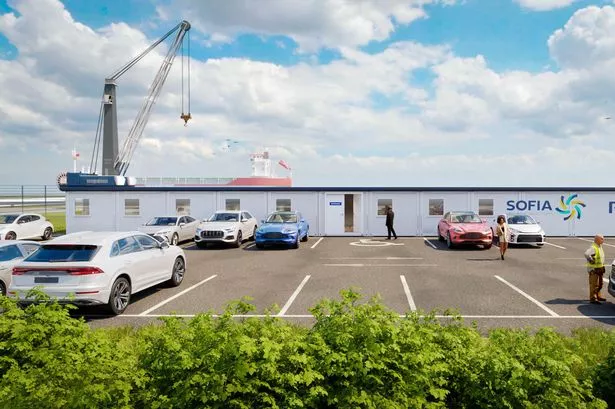
Port of Blyth chosen as construction base for huge offshore wind farm
A North East port has been chosen as the construction base for one of the world’s largest wind farms. The recently redeveloped Bates Clean Energy Terminal at the Port of Blyth will be used for RWE’s Sofia offshore wind scheme in the North Sea. The new-build facility will include office space, a storage area and a car park, with the facility in place for the next three-and-a-half years. Following the decision two years ago to site an operations and maintenance base for the Dogger Bank wind farm at the Port of Tyne, the decision cements the North East’s position as a key region in the lucrative and fast-growing offshore energy sector. Read more:offshore sector optimistic for year ahead The base will host RWE’s Marine Coordination Centre personnel, who are responsible for the planning and coordination of all offshore activities during the construction phase of the Sofia Offshore Wind Farm. It will have direct access to the port’s heavy lift quay, as well as other services. Martin Lawlor, chief executive of Port of Blyth, said: “We are delighted to have been selected by RWE as the base for the construction of such a significant UK development. Having over 21 years of experience in the offshore wind sector, the port is proud to be at the forefront of projects of this scale contributing to the energy transition. With the addition of strategic partners like RWE, Bates Clean Energy Terminal will continue to attract major offshore energy companies to join the clean energy revolution here in Blyth.” Matthew Swanwick, RWE’s Sofia project director, said: “Choosing the base for Sofia’s offshore construction has been a key decision as it will be home to the team for more than three years and will play a vital role in the successful completion of the project. The Port of Blyth offers us not only a strategic location and access to a strong marine supply chain but also an impressive new facility that will also ensure a legacy beyond the project.” The 1.4GW Sofia Offshore Wind Farm project is located on Dogger Bank in the North Sea, 120 miles off the North East coast. The construction base is the Port of Blyth’s second announcement related to the Sofia project, following a decision by Dutch firm Van Oord to use the port for the storage and mobilisation of cables for the wind farm. A number of reports in recent weeks have highlighted the opportunities for the North East to capitalise on the global shift to decarbonising power generation and other areas. But the reports from the likes of Deloitte, Onward and ORE Catapult have also pointed to significant challenges for the sector, including skills shortages, lack of public investment and competition from other parts of the world. READ NEXT: Kinewell Energy ramps up growth after landing major offshore wind contract Nissan passes 250,000 Leaf milestone at Sunderland plant
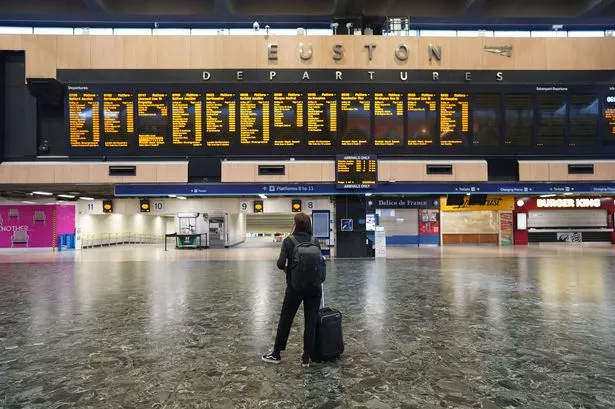
Where strike action will affect Christmas travel plans
Industrial action will cause disruption for travellers on the run up to Christmas. Here is a rundown of how travel will be affected, on which days and locations. Thousands of Rail, Maritime and Transport union (RMT) members are going on strike from December 13 to 18. Workers at Network Rail and train companies will walk out on Tuesday, Wednesday, Friday and Saturday. Services on those days will start later and finish much earlier than usual, with trains running between 7.30am and 6.30pm. Many parts of Britain will have no trains, including most of Scotland and Wales. Disruption due to ice and snow is also likely to cause further misery to passengers on strike days. RMT workers at Network Rail will also strike from 6pm on Christmas Eve until 6am on December 27. It is likely that passengers travelling on Christmas Eve will be urged to complete their journeys by the time that industrial action begins. READ MORE: Royal Mail staff set to strike again in dispute over pay, jobs and conditions Members of the Public and Commercial Services union (PCS) at National Highways in operational roles on roads and in control centres will take part in a series of staggered strikes from Friday to January 7. National Highways, which is responsible for managing England’s motorways and major A-roads, does not expect he action to have a significant impact on traffic as only around 8% of its frontline workforce are PCS members. But many of its routes already suffer from severe congestion during the Christmas getaway. We cover all the latest news with journalists based in the regions - you can read more here. To stay up to date with us you can: Border Force workers are set to strike on December 23. PCS members at Heathrow, Gatwick, Manchester, Birmingham, Cardiff and Glasgow airports will walk out. Extensive passport checks are only carried out on arrival but long queues could see passengers held on planes after they land, causing delays to departures. Airlines have been urged by Border Force to cancel up to 30% of flights on strike days to prevent chaos at airports. But easyJet said it intends to run its full schedule as “we want to take our customers on their planned trips at this important time of year”. The only sea port affected by the Border Force strikes is Newhaven, East Sussex, from where ferry services operate to and from Dieppe, France. A walkout in Kent affecting the Port of Dover and Eurotunnel would likely cause severe disruption. Eurostar will run a revised timetable between Tuesday and Saturday due to the reduction in running hours on rail lines caused by the RMT strikes at Network Rail. The operator is not affected by the Border Force walkout, and does not anticipate its services will be affected when RMT members employed as security staff by private contractor Mitie at London St Pancras International go on strike over the next fortnight. READ NEXT: Get our front page headlines Cost of Living: List of firms helping staff with bonus payments Dyson founder calls home working rights plans ‘economically illiterate’
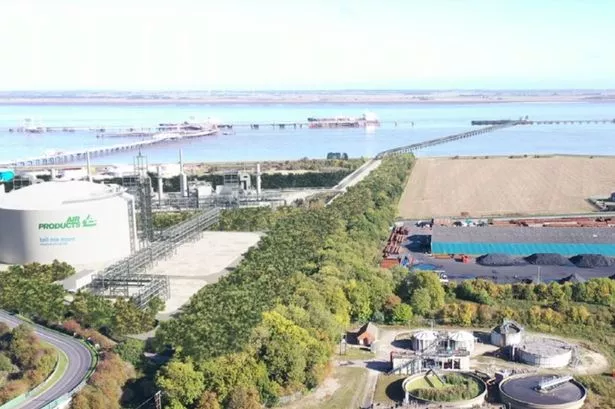
First images of how Immingham Green Energy Terminal could look as public consultation begins
Immingham Green Energy Terminal is today being put to the public as statutory consultation begins, with first impressions of what it could look like released. The huge plan, potentially creating more than 1,000 jobs and a £4 billion boost to the UK economy, would see ammonia imported for port-centric hydrogen production, with carbon also shipped in for storage. Located on the eastern wing of Port of Immingham, the proposed development includes a new jetty with up to two berths and the infrastructure to handle bulk liquids as well as two substantial production sites - with the scale now visualised. Associated British Ports is working with the global market leader in hydrogen production, Air Products, who would construct and operate the significant facility, straddling the eastern entrance to the port, on ABP land. First revealed last summer, imported carbon would feed into the Viking CCS proposal, linking the power and refining cluster beside the port with depleted oil and gas caverns beneath the North Sea, via the former Theddlethorpe terminal on the Lincolnshire coast. Read more:Big interview with Humber ports director Simon Bird A capital investment cost has yet to be disclosed, but it is understood to be in the hundreds of millions, with port and industrial process development twinned. A 1,100m jetty would be positioned beyond the existing oil terminal, with link and walkways as well as loading arms and pipelines incorporated. Land-side two operational sites, east and west, would support production, with pipelines between them, and a refrigerated ammonia storage tank. Liquefiers and loading bays for road tankers would also feature. Inviting the public to share their views, a spokesperson for the port operator said: “These proposals would create a brand-new hydrogen production facility in the heart of the Humber’s energy estuary. IGET would contribute to the Humber 2030 Vision, where the Humber Energy Board is driving forward change in our local industries, decarbonising the Humber and delivering clean energy for the future.” ABP intends to submit a development consent order to the Secretary of State, via the Planning Inspectorate, this summer. It comes as its application for Immingham Eastern Ro-Ro Terminal, a £100 million proposal to facilitate Humber expansion for Swedish ferry operator Stena Line, has just been received by the government body. Last week a hydrogen trial was unveiled in the port - using the clean fuel to power plant on the container terminal - with senior representation from both ABP and Air Products as a glimpse of what could be achieved was given. The IGET development proposal constitutes a nationally significant infrastructure project, leading to the central government decision-making role. The consultation, the initial element of this, runs until February 20, with in-person consultation sessions at Immingham Civic Centre. They take place on Wednesday, January 18, between 8am and noon; Thursday, January 19 between 3.30pm and 7.30pm; Wednesday, February 1, between 8am and noon; Thursday, February 2, between 3.30pm and 7.30pm; Friday, February 17, between noon and 4pm and Saturday, February 18 between 10am and 2pm. Further information is available on the project website.